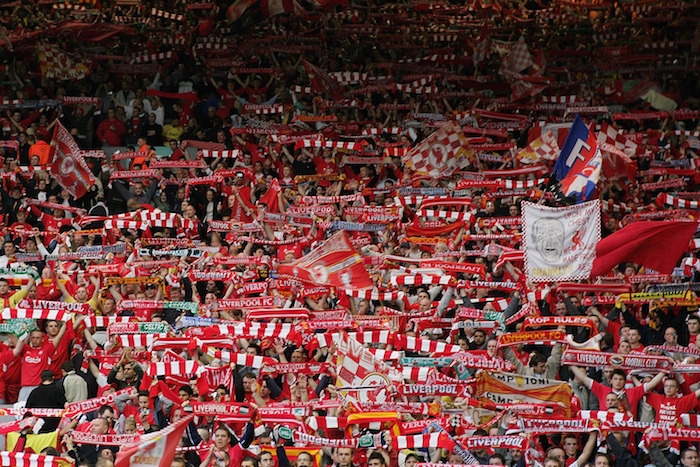The only photograph I posted on Instagram during the previous Venice Biennale was of a sign outside an Irish bar not far from the Arsenale. I had googled ‘Venice football’ and was not the only tourist to have done so. The bar – cramped, the walls exposed grey bricks – was naturally divided into the fans of the two teams playing that night. Barcelona in the front, Liverpool in the back. It was small enough to feel tense. On the wall outside, the bar staff had posted a printout advertising ‘Liverpool – Barcellona [sic], 9.00pm’. At the end of the match, someone took a pen and wrote 4-0 on the sign, with an arrow pointing the ‘4’ towards ‘Liverpool’. A note for a room full of people who had seen the event with their own eyes but could barely believe it, an inscription reaffirming the impossible.
I had travelled to Venice to see the Biennale, hoping for shared experiences with other viewers. To watch videos in darkened rooms with others, to have discussions while walking through the Giardini, to participate in a common dialogue. On the night of the game, I was with a group of friends and Liverpool fans. We were planning to go to a nearby performance by Joan Jonas, but agreed to watch the game first. Because, like an exhibition, football is an event, and so we came together even though we held out little hope of victory in this, the semi-final of the European club cup. Barcelona were one of the best teams in the world, had arguably the best player in the world, Lionel Messi, one of the best defences in the world. Oh, and a 3-0 advantage from the first leg of the tie, played the week before. Liverpool were missing their star strikers, had nothing but faith on their side. A 4-0 victory is rare. A 4-0 in a semi-final almost unheard of, but we saw it happen.
My friends and I shifted too quickly at the game’s conclusion from nervous stiffness to drunk elation. I look at that snapshot I took outside the bar, smoking cigarettes, trying to calm down, knowing that we would miss the Joan Jonas performance, knowing that we’ve experienced so much already. Whoever took a pen to that printed-out sign was trying to grapple with what I think of as the territory of art, of culture: an attempt to reimagine the world, to find the language or the image through which to share an experience. That photograph feels like a lesson in narrative – that night, my friends, the game: I remember everything. I could describe it a thousand different ways. I could call it love.
Fandom is a decision to love. It’s a commitment – long-term, inexplicable, frustrating and joyful – to the moment, to other human beings, a form of empathy. For fans, the exasperation and tension meet in the faith (and at times, the confirmation) that everything is possible. Every fan carries such a miracle with them. I write about Liverpool Football Club when I want to write about life, because I can’t find a version of life more intense than football. I write about miraculous nights because I know that like the communal experience of a great work of art, like love, like a real connection with other people, they are rare. And worth paying attention to.
Online exclusive published on 6 December 2019
